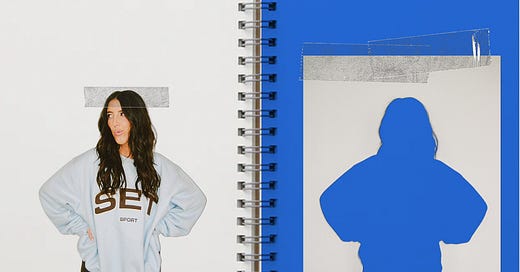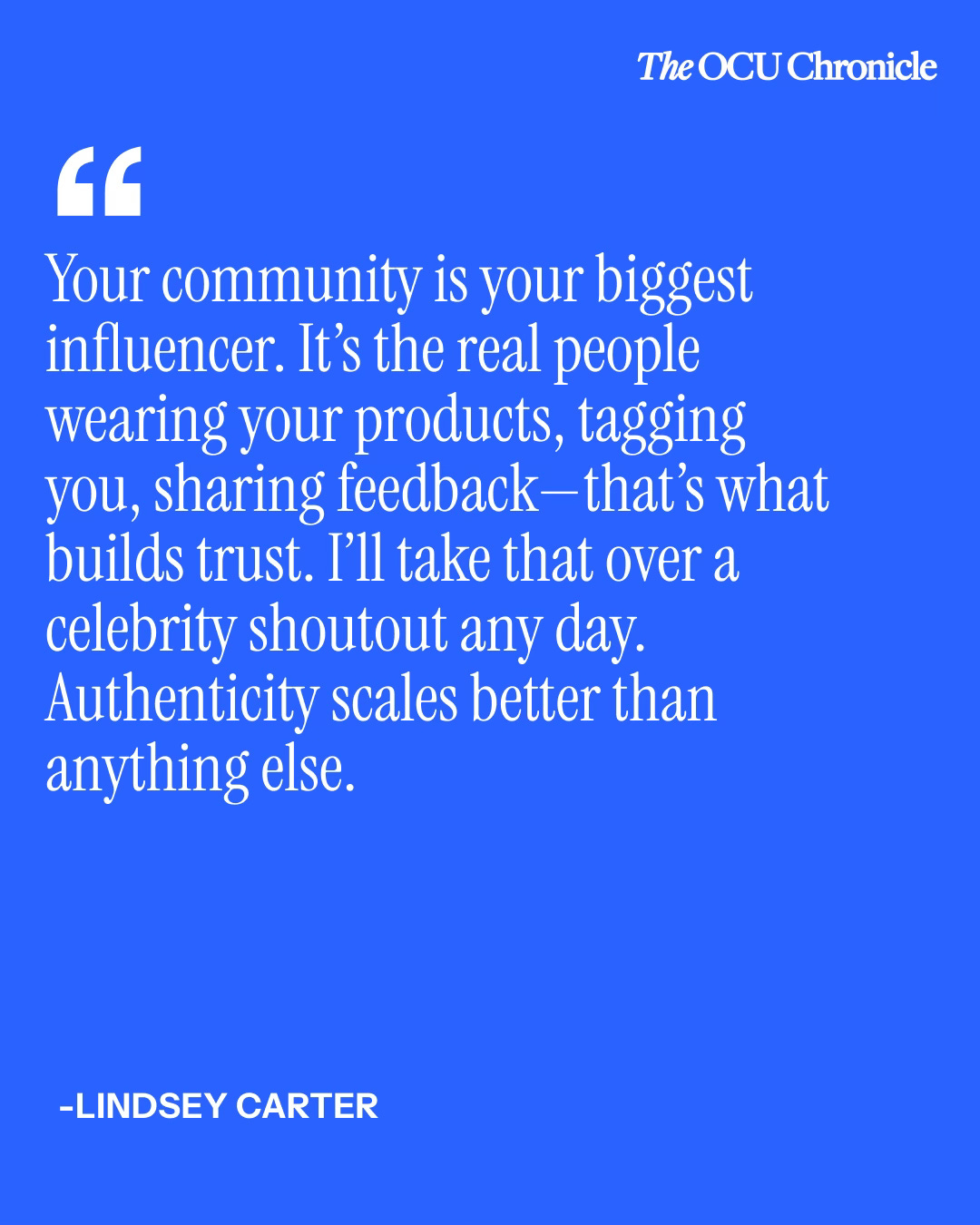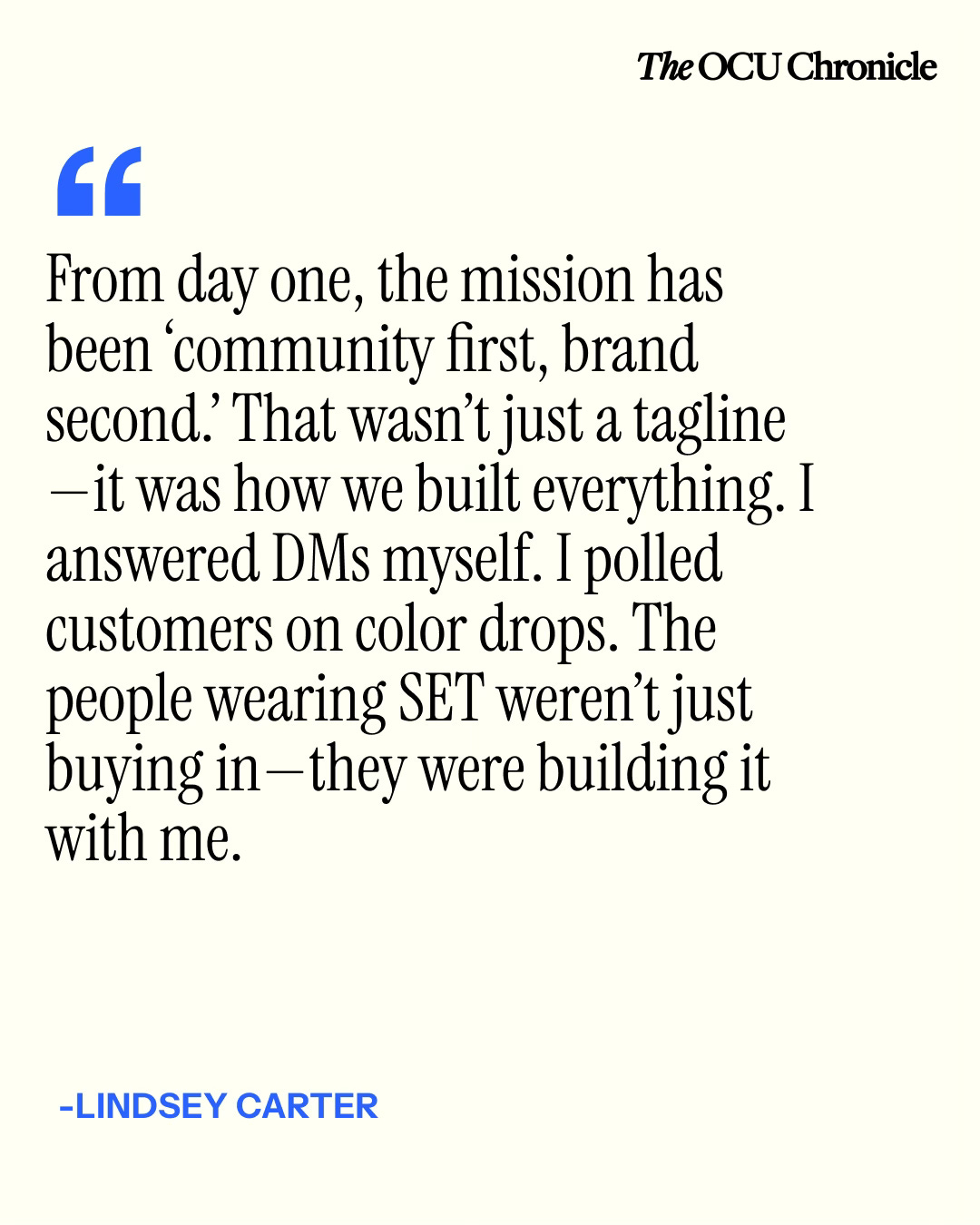How Lindsey Carter Built SET Active Into A Cult Brand
The founder shares how she turned a gap in the market into a movement—and why community, creativity, and confidence are always in style.
When Lindsey Carter launched SET Active in 2018, she wasn’t trying to chase trends—she was solving a problem. Tired of switching outfits between workouts, meetings, and errands, she envisioned a brand that blurred the line between form and function. The result? A cult-favorite label that has helped to redefine the athleisure category—and provided a masterclass in community building.
In this conversation, Carter opens up about the early hustle of launching her brand, how her background in content creation helped her scale the business, and why integrity, intention, and empathy have always been at the core of everything she does. From motherhood to marketing strategy, Carter offers advice on thoughtful growth, brand building, and finding balance.
OCUC: What inspired you to start SET Active, and what gap were you trying to fill in the activewear market?
Lindsey Carter: I founded SET Active in 2018 after noticing a significant gap in the activewear market. While existing brands were targeting specific niches like runners or yogis, I felt there wasn't a company marketing to the everyday person like me. I was constantly transitioning between meetings, workout classes, and errands, and I needed versatile clothing that could keep up with my lifestyle. I wanted to create activewear that made me feel put together and confident throughout my day. That's really what inspired SET—I wanted to blur the lines between form and function, creating pieces that didn't sacrifice comfort for style or vice versa. I figured that if I was feeling this need for transitional athleisure, many others probably were too, so I just went for it.
OCUC: How did your background in content creation influence the early stages of SET?
LC: My experience in social media and marketing was absolutely crucial when launching SET Active. Before founding the brand, I worked as an executive assistant at NBC Universal, held a marketing position at Variety magazine, and eventually started my own social media agency, where I managed accounts for clients like Maddie and Mackenzie Ziegler from Dance Moms. This background gave me a deep understanding of how to build engaged online communities and develop effective brand strategies. When I launched SET, I leveraged those skills to connect directly with potential customers. I would post customer reviews and poll my small following on social media about colors, styles, and cuts they wanted to see. This feedback loop was invaluable in shaping our early products and building a community that felt invested in our success from the beginning.
OCUC: Where do you draw aesthetic inspiration from—fashion, culture, interiors?
LC: I draw inspiration from everywhere—contemporary fashion trends, modern architecture, interior design, and most importantly, the lifestyle of our community members. I've always been drawn to clean lines and monochromatic color palettes, which you can clearly see in SET's aesthetic. I believe in creating pieces that feel timeless rather than trendy, which is why our designs have that minimalist, elevated feel.
I'm constantly observing how people live and move in their everyday lives, and I let that inform our design process. The goal has always been to create activewear that feels special and intentional—pieces you actually want to be seen in, regardless of whether you're heading to a workout class or a coffee meeting.
OCUC: SET has cultivated a strong, loyal community. What's been your approach to building that sense of connection?
LC: From day one, I've built SET with the mission of "community first and brand second." This wasn't just a marketing strategy—it's been our fundamental business philosophy. I make it a point to be incredibly accessible to our community. In the early days, I would personally respond to DMs, and I still check our messages regularly to see what conversations are happening. Whenever I'm feeling unmotivated, I'll hop into SET's DMs and see customers telling us how our products have changed their lives and made them feel confident. These direct connections with our community members are what drive me.
I also believe in bringing our community into the development process—we frequently poll our followers on color preferences, new product ideas, and feedback on existing items. I started showing behind-the-scenes content on social media before it was common practice, giving people a real look at our process. When consumers feel heard and valued, they develop a genuine connection to your brand. That's why our community is so strong—they know they're an integral part of our journey, not just passive customers.
OCUC: What role does influencer and UGC (user-generated content) play in your marketing strategy?
LC: User-generated content and our community are at the heart of our marketing approach. While we've been fortunate to have our sets worn by incredible influencers and celebrities, I've always believed that your community is your biggest influencer. These are the people who genuinely wear your product, talk about it authentically, and provide honest feedback.
We engage with our community across multiple platforms—Instagram, our email list of over half a million subscribers, my Substack, and broadcast channels. We encourage customers to share their SET styles, and we frequently repost this content. This approach creates a virtuous cycle where community members feel recognized and new customers can see real people enjoying our products.
While traditional influencer partnerships have certainly helped us grow, I've found that authentic, organic relationships work best. I'm more interested in working with people who genuinely love SET than forcing partnerships that don't feel natural. The most powerful marketing comes from real people sharing their genuine experiences with our products.
OCUC: Does your Jewish identity influence the way you've built your business and/or your day-to-day work?
LC: My background and upbringing have definitely shaped my approach to business, though I tend to express these values through my actions rather than explicitly labeling them. The emphasis on community that's central to SET Active certainly resonates with the strong sense of community I grew up with. I've built this business on relationships, honest communication, and treating both team members and customers with respect—values that were instilled in me from a young age.
I also believe deeply in creating something of genuine value and substance rather than just chasing trends or profits. There's a satisfaction in building something that serves others and stands the test of time, which guides many of my business decisions at SET Active.
OCUC: Are there any Jewish values that you've brought to your role as a founder?
LC: While I don't necessarily categorize my business principles by their cultural origins, there are certainly Jewish values I grew up with that influence how I lead SET Active. The concept of creating something meaningful and beneficial for others has been a driving force. I've always believed that business should be conducted with integrity and fairness, treating everyone from factory workers to customers with dignity and respect.
The importance of family and work-life balance also influences how I structure our company culture. As a mother of two young children, I understand the need for flexibility and support, and I try to create an environment where my team feels valued as whole people, not just employees.
I also believe strongly in giving back as we grow. As SET has become successful, I've felt an increasing responsibility to ensure we're making a positive impact beyond just selling products. This sense of responsibility to the broader community is something I carry with me in all aspects of the business.
OCUC: How do you maintain balance while running a high-growth brand?
LC: Finding balance has honestly been one of my biggest challenges, especially since becoming a mother. Being a mom and a CEO both demand your complete presence, which can feel impossible at times. The first year after having my son Ace was particularly difficult—I constantly felt like I was either abandoning my business or failing as a mom.
Recognizing this struggle, I started therapy and began to establish clearer boundaries between work and family time. I've had to learn that I can't do everything perfectly, and that's okay. Setting realistic expectations for myself has been crucial.
As a founder, you wear so many hats, especially with a small team. But as we've grown, I've focused on building a strong team that allows me to delegate more effectively. I'm still working on balance every day—it's not something you achieve once and then maintain effortlessly. It requires constant adjustment and prioritization.
The pandemic actually helped me reassess my priorities and create more structure in my day. Now with two young kids, ages three and two, I'm even more intentional about how I spend my time. Balance for me isn't about having equal time for everything, but rather being fully present wherever I am, whether that's in a business meeting or with my family.
OCUC: What advice would you give to students looking to break into fashion or DTC?
LC: For students looking to break into fashion or DTC, my first piece of advice is to gain diverse professional experiences. My background in social media marketing, content creation, and running my own agency gave me invaluable skills that I use every day at SET. Don't be afraid to take roles that might seem tangential to your ultimate goal—they often provide unexpected lessons and connections.
Second, identify genuine market gaps. SET succeeded because I recognized an unmet need for transitional athleisure that served everyday people. Look for problems you personally experience and consider how you might solve them better than existing options.
Third, build authentic community. When consumers feel heard and valued, loyalty and retention are much stronger. I caught on to this early, and it's been central to our growth. Don't just talk at your audience—create genuine dialogue and bring them into your process.
Start small and be willing to pivot. I began with a focused concept and have expanded thoughtfully based on customer feedback. Not everything will work the first time, and that's okay.
Embrace social media, not just as a marketing tool but as a way to connect directly with your audience. This direct line of communication has been invaluable for SET's development.
Finally, prepare for challenges. Running a business requires tremendous resilience, especially as you navigate growth and personal life changes. Find mentors who can guide you—I've been fortunate to have people like Jane Buckingham, who helped me navigate both business challenges and motherhood when I lost my own mom at a young age.
Remember that success rarely happens overnight. SET has grown steadily since 2018, but that growth came from consistent effort, genuine connection with our community, and a willingness to evolve while staying true to our core mission.
The views, thoughts, and opinions expressed herein are solely those of the author and do not necessarily reflect the official policy, position, thoughts, or opinions of Our CampUs United (“OCU”), its affiliates, or any other individuals or entities associated with OCU.







